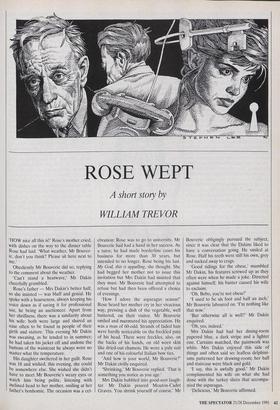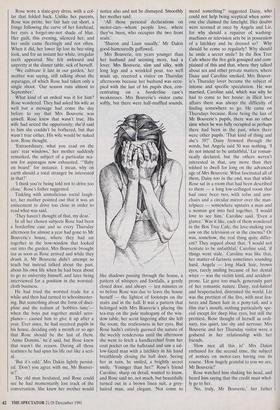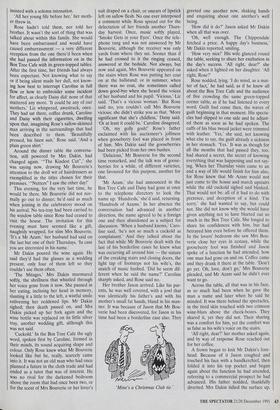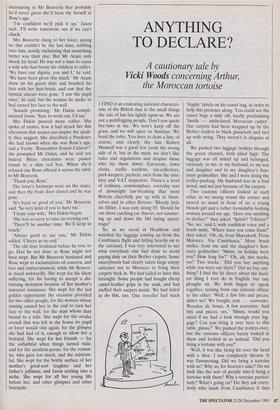ROSE WEPT
A short story by WILLIAM TREVOR
'HOW nice all this is!' Rose's mother cried, with dishes on the way to the dinner table Rose had laid. 'What weather, Mr Bouver- ie, don't you think? Please sit here next to me.'
Obediently Mr Bouverie did so, replying to the comment about the weather.
`Can't stand a heatwave,' Mr Dakin cheerfully grumbled. Rose's father — Mrs Dakin's better half, so she insisted — was bluff and genial. He spoke with a hoarseness, always keeping his voice down as if saving it for professional use, he being an auctioneer. Apart from her shrillness, there was a similarity about his wife: both were large and shared an ease often to be found in people of their girth and stature. This evening Mr Dakin was sweating, as he tended to in summer; he had taken his jacket off and undone the buttons of the waistcoat he always wore no matter what the temperature.
His daughter sweltered in her guilt. Rose was 18 and wished, this evening, she could be somewhere else. She wished she didn't have to meet Mr Bouverie's weary eyes or watch him being polite, listening with inclined head to her mother, smiling at her father's bonhomie. The occasion was a cel-
ebration: Rose was to go to university, Mr Bouverie had had a hand in her success. As a tutor, he had made borderline cases his business for more than 30 years, but intended to no longer, Rose being his last. My God, this is appalling, she thought. She had begged her mother not to issue this invitation but Mrs Dakin had insisted that they must. Mr Bouverie had attempted to refuse but had then been offered a choice of evenings.
`How I adore the asparagus season!' Rose heard her mother cry in her vivacious way, pressing a dish of the vegetable, well buttered, on their visitor. Mr Bouverie smiled and murmured his appreciation. He was a man of 60-odd. Strands of faded hair were hardly noticeable on the freckled pate of his head. There were freckles, also, on the backs of his hands, on old worn skin like dried-out chamois. He wore a pale suit and one of his colourful Italian bow ties.
`And how is your world, Mr Bouverie?' Mr Dakin civilly enquired.
`Shrinking,' Mr Bouverie replied. That is something you notice as you age.'
Mrs Dakin bubbled into good-sort laugh- ter. Mr Dakin poured Mouton-Cadet Graves. You shrink yourself of course.' Mr Bouverie obligingly pursued the subject, since it was clear that the Dakins liked to have a conversation going. He smiled at Rose. Half his teeth were still his own, grey and sucked away to crags.
`Good tidings for the obese,' mumbled Mr Dakin, his features screwed up as they often were when he made a joke. Directed against himself, his banter caused his wife to exclaim: `Oh, Bobo, you're not obese!' `I used to be six foot and half an inch,' Mr Bouverie laboured on. 'I'm nothing like that now.'
`But otherwise all is well?' Mr Dakin enquired.
`Oh, yes, indeed.'
Mrs Dakin had had her dining-room papered blue, a dark stripe and a lighter one. Curtains matched, the paintwork was white. Mrs Dakin enjoyed this side of things and often said so: leafless delphini- ums patterned her drawing-room; her hall and staircase were black and gold.
`I say, this is awfully good.' Mr Dakin complimented his wife on what she had done with the turkey slices that accompa- nied the asparagus.
`Delicious,' Mr Bouverie affirmed. Rose wore a slate-grey dress, with a col- lar that folded back. Unlike her parents, Rose was petite, her fair hair cut short, a fringe following the curve of her forehead, her eyes a forget-me-not shade of blue. Her guilt, this evening, silenced her, and her smile came fleetingly and not often. When it did, her lower lip lost its bee-sting look, and for an instant her white, irregular teeth appeared. She felt awkward and unpretty at the dinner table, sick of herself.
`We cultivate it late in our garden,' her mother was saying, still talking about the asparagus, of which Rose had taken only a single shoot. 'Our season runs almost to September.'
What kind of an ordeal was it for him? Rose wondered. They had asked his wife as well but a message had come the day before to say that Mrs Bouverie was unwell. Rose knew that wasn't true. His wife had seized the opportunity; she'd said to him she couldn't be bothered, but that wasn't true either. His wife would be naked now, Rose thought.
`Extraordinary, what you read on the cars' rear windows,' her mother suddenly remarked, the subject of a particular sea- son for asparagus now exhausted. "'Baby on board" for instance. I mean, why on earth should a total stranger be interested in that?'
`I think you're being told not to drive too close,' Rose's father suggested.
Tinkling with unmalicious social laugh- ter, her mother pointed out that it was an enticement to drive too close in order to read what was said.
They haven't thought of that, my dear.'
In all her chosen subjects Rose had been a borderline case and so every Thursday afternoon for almost a year had gone to Mr Bouverie's house, where they had sat together in the bow-window that looked out into the garden, Mrs Bouverie brought tea as soon as Rose arrived and while they drank it, Mr Bouverie didn't attempt to teach but instead talked about the past, about his own life when he had been about to go to university himself, and later being interviewed for a position in the worsted- cloth business.
He had tried the worsted trade for a while and then had turned to schoolmaster- ing. But something about the form of disci- pline and the tedium of 'hobbies time'— when the boys put together model aero- planes— caused him to give it up after a year. Ever since, he had received pupils in his house, deciding only a month or so ago that Rose should be the last of them. `Anno Domini,' he'd said, but Rose knew that wasn't the reason. During all those teatimes he had spun his life out like a seri- al.
`But it's odd,' Mrs Dakin lightly persist- ed. 'Don't you agree with me, Mr Bouver- ie?'
The old man hesitated, and Rose could see he had momentarily lost track of the conversation. She knew her mother would notice also and not be dismayed. Smoothly her mother said: `All those personal declarations on motor-cars—whom people love, where they've been, who occupies the two front seats.'
`Sharon and Liam usually,' Mr Dakin good-humouredly guffawed.
Mrs Bouverie, ten years younger than her husband and seeming more, had a lover. Mrs Bouverie, slim and silky, with long legs and a wrinkled pout, too well made up, received a visitor on Thursday afternoons because her husband was occu- pied with the last of his pupils then, con- centrating on a borderline case's weaknesses. Mrs Bouverie's visitor came softly, but there were half-muffled sounds, like shadows passing through the house, a pattern of whispers and footfalls, a gently closed door, and always — ten minutes or so before Rose was due to leave the house herself — the lightest of footsteps on the stairs and in the hall. It was a pattern that belonged with Mrs Bouverie's placing the tea-tray on the pale mahogany of the win- dow table, her scent lingering after she left the room, the restlessness in her eyes. But Rose hadn't entirely guessed the nature of the weekly rendezvous until the afternoon she went to fetch a handkerchief from her coat pocket on the hallstand and saw a sal- low-faced man with a latchkey in his hand breathlessly closing the hall door. Seeing her in turn, he smiled, a brightly secret smile. 'Younger than her?' Rose's friend Caroline, sharp on detail, wanted to know, and Rose said no, not much, but beautifully turned out in a brown linen suit, a grey- haired man, and elegant. 'Not come to
mend something?' suggested Daisy, who could not help being sceptical when some- one else claimed the limelight. Her doubts were scorned at once by Angela and Liz, for why should a repairer of washing- machines or television sets be in possession of a latchkey and be dressed so? Why should he come so regularly? Why should he smile a secret smile? In the Box Tree Cafe where the five girls gossiped and com- plained of this and that, where they talked about sex and other private matters, where Daisy and Caroline smoked, Mrs Bouver- ie's Thursday lover became the subject of intense and specific speculation. He was married, Caroline said, which was why he had to come to her house: in illicit love affairs there was always the difficulty of finding somewhere to go. He came on Thursdays because, Rose being the last of Mr Bouverie's pupils, there was no other time when he was fully occupied as perhaps there had been in the past, when there were other pupils. 'That kind of thing and she's 50?' Daisy frowned through the words, but Angela said 50 was nothing. 'I do not intend to be unfaithful,' Liz roman- tically declared, but the others weren't interested in that, any more than they wished to dwell for long on the advanced age of Mrs Bouverie. What fascinated all of them, Daisy too in the end, was that while Rose sat in a room that had been described to them — a long low-ceilinged room that had once been two, with sofas and arm- chairs and a circular mirror over the man- telpiece — somewhere upstairs a man and a woman got into bed together. 'I would love to see him,' Caroline said. 'Even a glance.' Was it like, each of them wondered in the Box Tree Cafe, the love-making you saw on the television or in the cinema? Or was, somehow, the real thing quite differ- ent? They argued about that. 'I would not hesitate to be unfaithful,' Caroline said, 'if things went stale.' Caroline was like that, her matter-of-factness sometimes sounding hard. Angela — long black hair, brown eyes, rarely smiling because of her dental wires — was the victim kind, and accident- prone. Liz gave too much, generosity part of her romantic nature. Daisy, red-haired and bespectacled, distrusted the world. Liz was the prettiest of the five, with neat fea- tures and flaxen hair in a pony-tail, and a film star's mouth, nothing particularly spe- cial except for deep blue eyes, but still the prettiest. Rose thought of herself as ordi- nary, too quiet, too shy and nervous: Mrs Bouverie and her Thursday visitor were a godsend in her relationship with her friends.
`How nice all this is!' Mrs Dakin enthused for the second time, the subject of notices on motor-cars having run its course. 'How hugely grateful to you we are, Mr Bouverier Rose watched him shaking his head, and heard him saying that the credit must whol- ly go to her.
`No, truly, Mr Bouverie,' her father insisted with a solemn intonation.
`All her young life before her,' her moth- er threw in.
Rose hadn't told them, nor told her brother. It wasn't the sort of thing that was talked about within this family. She would have been embarrassed and would have caused embarrassment — a very different reception from the one there'd been when she had passed the information on in the Box Tree Cafe with its green-topped tables. After the first time, her friends had always been expectant. Not knowing what to say or if being silent made her dull, not know- ing how best to interrupt Caroline in full flow or how to embroider some incident for affect, as clearly Daisy did: none of that mattered any more. 'It could be any of our mothers,' Liz whispered, awestruck, once. They had sat there, coffee drunk, Caroline and Daisy with their cigarettes, dwelling upon that, imagining Rose's sallow-skinned man arriving in the surroundings that had been described to them. 'Beautifully pressed, his linen suit,' Rose said. 'And a plain green shirt.'
Around the dinner table the conversa- tion, still powered by Mrs Dakin, had changed again. "'The Kindest Cut",' she was saying now, drawing Mr Bouverie's attention to the droll wit of hairdressers as exemplified in the titles chosen for their premises. "'Nutters" I saw the other day!'
This evening, for the very last time, he would be there. Mr Bouverie did not nor- mally go out to dinner; he'd said as much when joining in the celebratory mood on his arrival. No tea-tray had been carried to the window table since Rose had ceased to visit the house. The invitation for this evening must have seemed like a gift, naughtily wrapped, for slim Mrs Bouverie. `It's a Mr Azam,' her husband had said on the last but one of their Thursdays. 'In case you are interested in his name.'
Mr Dakin poured the wine again. He said they'd had the glasses as a wedding present, only four of them left so they couldn't use them often.
`The Mitages,' Mrs Dakin murmured softly, the shrillness that whistled through her voice gone from it now. She paused in her eating, inclining her head in memory, slanting it a little to the left, a wistful smile enlivening her reddened lips. Mr Dakin sighed; then death passed on, and Mrs Dakin picked up her fork again and the wine bottle was replaced on its little silver tray, another wedding gift, although this was not said.
`Cuckold.' In the Box Tree Cafe the ugly word, spoken first by Caroline, formed in their minds, its sound acquiring shape and colour. Only Rose knew what Mr Bouverie looked like but he, really, scarcely came into it. It was not an old man who had once planned a future in the cloth trade and had ended as a tutor that was of interest. He was no rival for the darkened bedroom above the room that had once been two, or for the scent of Mrs Bouverie or her lover's
suit draped on a chair, or smears of lipstick left on sallow flesh. No one ever interposed a comment while Rose spread out for the delectation of her friends another Thurs- day harvest. Once, music softly played, `Smoke Gets in your Eyes'. Once the tele- phone rang and was not answered by Mr Bouverie, although the receiver was only yards from where they sat. Sooner than if he had crossed to it the ringing ceased, answered at the bedside. Not always, but now and again, Mrs Bouverie appeared on the stairs when Rose was putting her coat on at the hallstand; or in summer, when there was no coat, she sometimes called down good-bye when she heard the voices of her husband and his pupil. 'Vicious,' Liz said. 'That's a vicious woman.' But Rose said no, you couldn't call Mrs Bouverie vicious; she didn't strike you as that. 'More significant that she's childless,' Daisy said. `Or at least it could be.' Caroline disagreed.
'Oh, my golly gosh!' Rose's father exclaimed with his auctioneer's jolliness when gooseberry fool was placed in front of him. Mrs Dakin said the gooseberries had been picked from her own bushes.
`Delicious,' Mr Bouverie for the second time remarked, and the talk was of goose- berries for a while, of different varieties, one favoured for this purpose, another for that.
`Mr Azam,' she had announced in the Box Tree Cafe and Daisy had gone at once to the telephone directory to look the name up. 'Hundreds,' she'd said, returning. `Hundreds of Azams.' In her absence the conversation had advanced in another direction, the name agreed to be a foreign one and then abandoned as a subject for discussion. 'When a husband knows,' Caro- line said, 'he's not so much a cuckold as complaisant.' And they talked about the fact that while Mr Bouverie dealt with the last of his borderline cases he knew what was occurring all around him — the nature of the creaking stairs and closing doors, the light tap of footsteps not his wife's, the snatch of music hushed. 'Did he seem dif- ferent when he said the name?' Caroline sharply asked, and Rose said no.
Her brother Jason arrived. Like his par- ents, he was well covered, with a jowl that was identically his father's and with his mother's small fat hands, bland in his man- ner. It was because of Jason that Mr Bou- verie had been discovered, for Jason in his time had been a borderline case also. They `Mine's a Christmas Club tie.' greeted one another now, shaking hands and enquiring about one another's well being.
`How did it do?' Jason asked Mr Dakin when all that was over.
`Oh, well enough. The Chippendale fetched a price. A happy day's business,' Mr Dakin reported, smiling.
`How very nice!' His wife glanced round the table, seeking to share her exultation in the day's success. 'All right, dear?' she asked when it lighted on her daughter. 'All right, Rose?'
Rose nodded, lying. 'I do mind, as a mat- ter of fact,' he had said, as if he knew all about the Box Tree Cafe and the audience of five crowding the same green-topped corner table, as if he had listened to every word. Guilt had come then, the waves of guilt beginning in that moment. His specta- cles had slipped to one side and he adjust- ed them as soon as he had spoken. The cuffs of his blue tweed jacket were trimmed with leather. 'Yes,' she said, not knowing what else to say, the guilt already a sickness in her stomach. 'Yes.' It was as though for all the months that had passed they, too, had shared a secret, the secret of knowing everything that was happening and not say- ing. When her Thursday visits came to an end a way of life would finish for him also, for Rose knew that Mr Azam would not just come to the house and march upstairs while the old cuckold sighed and blinked. That would not be: all of it had to do with pretence, and deception of a kind. 'I'm sorry,' she had wanted to say, but could not. She did not know why she would have given anything not to have blurted out so much in the Box Tree Cafe. She longed to share his confidences with him, but had betrayed him even before he offered them. In the lovers' bedroom she saw Mrs Bou- verie close her eyes in ecstasy, while the gooseberry fool was finished and Jason spoke of a function he had attended, how one man had gone on and on. Coffee came and they drank it there at the table. 'Don't go yet. Oh, love, don't go,' Mrs Bouverie pleaded, and Mr Azam said he didn't ever want to go.
Across the table, all that was in his face, as so much had been when he gave the man a name and later when he said he minded. It was there behind the spectacles, in the tired skin touched with two crimson wine-blurs above the cheek-bones. They shared it, yet they did not. Their sharing was a comfort for him, yet the comfort was as false as his wife's voice on the stairs.
`All right, dear?' her mother asked again, and by way of response Rose reached out for her coffee.
A frown began to knit Mr Dakin's fore- head. Because of it Jason coughed and touched his face with a handkerchief, then folded it into his top pocket and began again about the function he had attended, referring to a commercial prospect he had advanced. His father nodded, thankfully diverted. Mrs Dakin tidied the surface up, murmuring to Mr Bouverie that probably he'd never guess she'd been shy herself at Rose's age.
`I'm confident we'll pick it up,' Jason said. 'I'll write tomorrow, see if we can't clinch.'
Mrs Bouverie clung to her lover, saying no this couldn't he the last time, sobbing over him, noisily exclaiming that something better was their due. But Mr Azam only shook his head. He was not a man to cause a wife who had borne his children to suffer. `We have our dignity, you and I,' he said. `We have been given this much.' Mr Azam drew on his green shirt and brushed his hair with her hair-brush, and saw that the lipstick smears were gone. 'I saw the pupil once,' he said, but the woman he spoke to had turned her face to the wall.
`Sounds promising,' Mr Dakin compli- mented Jason. 'Sure to work out, I'd say.'
Mrs Dakin poured more coffee. She spoke of names, how it had struck her this afternoon that names can inspire the quali- ty they suggest. She described a Prudence she had known when she was Rose's age, and a Verity. 'Remember Ernest Calavor?' she prompted Mr Dakin, and he said yes indeed. Bitter chocolates were passed round in a slim red box. When she'd refused one Rose offered it across the table to Mr Bouverie.
`Thank you, Rose.' The lover's footsteps were on the stairs, and then the front door closed and he was gone.
'It's been so good of you,' Mr Bouverie said. `So very kind of you to have me.'
I hope your wife,' Mrs Dakin began.
`She was so sorry to miss an evening out.' `There'll be another time. We'll keep in touch.'
`Always good to see you,' Mr Dakin added. 'Cheers us no end.'
The old man hesitated before he rose to go. Had he not done so Rose might not have wept. But Mr Bouverie hesitated and Rose wept to exclamations of concern, and fuss and embarrassment, while Mr Bouver- ie stood awkwardly. She wept for his silent suffering, for his having to accept a dis- tressing invitation because of her mother's innocent insistence. She wept for the last golden opportunity the occasion provided for two other people, for the woman whose sinning caused her in the end to turn her face to the wall, for the man whom duty bound to a wife. She wept for the modus vivendi that was left in the house no pupil or lover would visit again, for the glimpse she had had of it, enough to allow her a betrayal. She wept for her friends — for the unfaithful when things turned stale, and for the accident-prone; for the roman- tic, who gave too much, and the mistrust- ful. She wept for the brittle surface of her mother's good-sort laughter and her father's jolliness, and Jason settling into a niche. She wept for all her young life before her, and other glimpses and other betrayals.













































































































 Previous page
Previous page